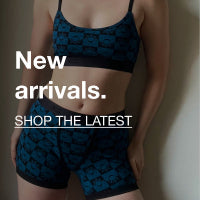Tomboy Tuesday: Allé

Talking with Allé K is as refreshing as it is educational. He speaks with serene confidence about yoga, transness and intersecting identities, social justice and collective liberation. And he wears the hell out of a pair of TomboyX Boxer Briefs. Read on to get to know him!
*********
Allé K: I'm Allé. My pronouns are he/him. I'm currently based on unceded Cherokee land in Asheville, North Carolina. I'm a queer and trans and fat yoga teacher. It's really important for me to say all of that, because I'm trying to change the narrative around who is a yoga teacher and who gets to take up space in the yoga world, both as a student and as a teacher.
A lot of times we think of yoga teachers as these Barbie-like images of thin, cishet, white, able-bodied women. I was never that and I never identified with that. And for a long time, I felt like I didn't belong in the yoga world.
TomboyX: How did you become interested in yoga?
AK: My mom was doing Kundalini yoga while she was pregnant with me. She took me to an ashram when I was like three years old, so I was exposed to chanting and meditation, more of the traditional parts of yoga that come from India than the Western idea of yoga as a workout. For me, it was always more than a workout. I think that's really important to my practice, because to this day, yoga asana is a part of my practice, but it's not the whole practice. I think that when trans and queer folks know that yoga is more than a workout, it becomes more accessible, and inclusive and appealing. A lot of folks in our communities have trauma from entering exclusive or unwelcoming yoga and wellness spaces. Just knowing that it doesn't have to look like that is really helpful.
TBX: How do you define yoga?
AK: Yoga, to me, is really a path to finding yourself, which is why I feel like it's so vital for our queer trans community to access– because while we we're trying to figure out our sexuality and our gender and how we identify, it can be a great way to sit with the discomfort of not knowing. I would say that yoga definitely helped me figure out that I was trans. Ten years ago, I didn't even really know what trans was or that I could be it. I didn't have any language, any resources about it, no knowledge.
I think yoga kind of became cool ten plus years ago. For me, it did have to be about the superficiality of it for a little while. About the workout, the body image, and losing weight, because I have a history of disordered eating and body dysmorphia. So for a while I did want to change my body and lose weight. I'm still working through it. I think it did have to be like that kind of cool, trendy thing for me for a while.
TBX: What else are you passionate about?
AK: Self-acceptance, self-love, growth, self-inquiry. Collective liberation. I've always been really passionate about inclusion. I was always the new kid in school because we (my family) kept moving. I'm not sure if that's what made me really aware of people feeling left out, because I experienced it so many times. But it might be.
TBX: What would the world look like if you were in charge?
AK: We'd all be housed and fed. We'd be able to have babies if we want babies and not have babies if we don't want babies. We’d be able to have sex with, and love, whoever we want. We could change our gender like we change our houseplants. There wouldn't be war.
We wouldn't have immigrants denied at the border for the color of their skin. We’d have size-inclusive clothing everywhere. One thing I got from living in Madagascar Peace Corps was living off screens more, in human connection with people more.
We'd be able to center ourselves and breathe deeply enough to feel it and live in heart-centered ways and have heart-centered interactions with others. When we're using technology, we're so involved with this performativity and productivity, like performing outcomes and robot culture. It's just not connecting enough with the humanity of our lives.
TBX: Do you see yoga as a means for that?
AK: Yeah. That's what it's been for me. And I know it's not for everyone, and that's fine. Dharma, my teacher, says if you don't love yoga, go to the gym. Just because it's my favorite healing method, it doesn't have to be your cup of tea. Not everyone drinks tea. Some like espresso.
TBX: I’m curious if there is an intersection of yoga and supporting and amplifying marginalized people, especially understanding that yoga has become such a westernized, homogenized thing in so many parts of the U.S..
AK: Yoga, at its roots, is a liberatory practice. It aims to relieve all beings everywhere from pain and suffering. It is literally done so that we can free ourselves, so that we can free each other. It is literally a tool for collective liberation. That's what it is at the heart of it.
It's just so obvious to me that yoga is social justice. I teach yoga for queer and trans and fat folks because, first of all, not enough people are doing it. I won't say no one's doing it. There's a lot more queer and trans teachers these days, especially in the pandemic. Queer folks and trans folks have already been doing this work towards liberation. We have figured out that we are not what society raised us to be. Like, “you will marry someone of the ‘opposite’ sex and you'll have a white picket fence and a dog.” And we were like, “no, actually, I found out this thing about myself that's true.” I did this work to realize I'm not the gender that y'all said I was. That is inherently a yogic process, whether you use yoga or not– you did the work of finding yourself. That's what yoga is. So to me, they just go together so easily.
TBX: Can you tell me a little bit about your journey to finding your queer and trans identities?
AK: I got back to the US [from the Peace Corps] in 2015. Orange Is The New Black came out in 2014, with Laverne Cox…more people were getting language around trans identities and gender non-conformity in the years that I was living without the internet, so I missed a lot of cultural context. And then I came back and was still very lost, dealing with a lot of my own healing and trauma, PTSD. I saw someone that I met on Twitter who got top surgery, and I was like, “I don't know what that is, but I want it.” I DM’d them and I was like, “how do I get that?”
I didn't embrace the word ‘trans’ initially. I started using they/them pronouns for myself in 2017. Then I started teaching queer trans yoga in fall of 2019, when I inherited the class from someone else. I didn't think I was queer or trans enough to do it. But someone else had already established this class as queer, trans, non-binary yoga. And I was like, “well, I'm definitely non-binary.” And then within three months I got top surgery. Then in 2020 I started identifying as trans and stopped identifying as non-binary. Now I identify as trans masc-ish. Because what is masc? I'm still defining and re-defining that for myself. I grew up with a lot of toxic ideas about and representations of masc and maleness.
TBX: Who do you see as your audience on social media?
AK: Half the time I'm talking to cishets trying to educate them. Half the time I'm talking to our community, helping them see how they can be free or how they can use yoga as a tool to live their best life.
I would love to spend more time just being with our community. And at the same time, I feel like until these attacks on trans kids in Texas and across the US stop, we have to keep educating and advocating until we're all free. But it's important for us, as trans folks and queer folks, to not always be advocates but to just sometimes live our lives.
TBX: Can you talk about the role of apparel in your life as your identities have shifted and the way that you feel in your body has shifted?
AK: It's been extremely important to have gender-affirming clothing. Obviously I'm a yoga teacher, so everything I wear has to be ready for me to go from a yoga class, to outdoors, to coffee, to lunch. Being a fat trans person has made it incredibly hard to find clothing that fits and affirms me. Even stores that say they're size inclusive, are not. You have to order clothes online, you can't try them on in the stores. You have to pay for the shipping and then they don't have free returns. It’s so annoying. It's literally fatphobia institutionalized. I have totally gotten rid of all my old clothes. I feel like I still don't dress super, super, super manly or masc. But also, what is that even?
*********
You can find Allé on Instagram @transyogateacher, on Patreon at patreon.com/transyogateacher, and you can take his yoga classes virtually from anywhere in the world and in person at the Sedona Yoga Festival and at pop ups around New York City this Pride month! Head to Transyogateacher.com for more info. He also leads Trans 101 trainings for corporate settings and yoga teachers alike.






